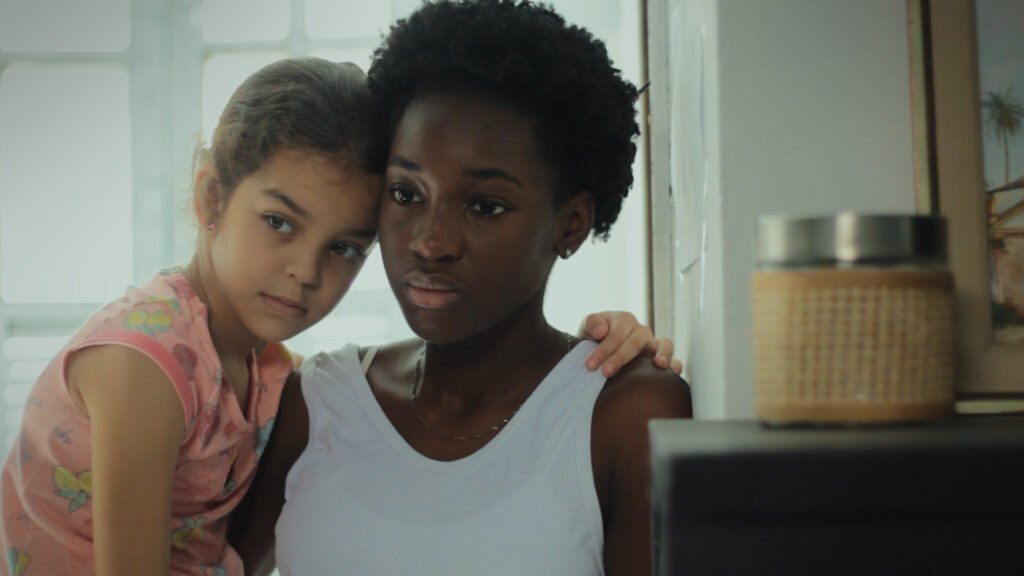
Actress
Brandy Burre is one person, but there’s also a “Brandy Burre.” This distinction between the two gets blurrier and blurrier as Robert Greene’s documentary “Actress” goes along.
Actually, calling “Actress” a documentary doesn’t feel entirely accurate. Yes, Greene follows around Burre, a mother of two who gave up acting and moved to Beacon, N.Y., for various reasons: It was pretty; she had no money; she’d just turned 40. He documents moments in her life the mundane (getting her young son and daughter dressed and out the door in the morning) and the monumental (the disintegration of her relationship with her children’s father, restaurateur Tim Reinke).
But here’s where things get complicated: Greene has adopted an aesthetic that mirrors Burre’s own sense of what it means to have a creative life. Or rather, he has chosen an aesthetic that reflects what she wants it to be as her restlessness sets in. (He has been her neighbor throughout this period; let that sink in.)
So sometimes we’re watching intimate domestic scenes shot plainly (Burre drinking red wine alone in sweats and a sloppy ponytail). Other times we’re watching artful interludes shot in rich color and exquisite slow motion (water gushing from the kitchen faucet onto a sponge as she scrubs dishes).
He is playing with us constantly and with our notion of what is authentic which can be intriguing or frustrating depending on your mood. She is doing it too; she likes trying on the role of bored housewife straight out of a Douglas Sirk melodrama but can also be very direct-pragmatic of the moment about things like labeling bins for toys.
She has long dark hair. Big dark eyes set deep into high cheekbones. Her voice is deep for a woman’s. She seems to talk to her kids like they’re little people, including the then 3-year old girl who is within earshot when her mom drops an F-bomb. (“Eat the cereal. The cereal will heal your brain,” Burre tells her daughter, who has a headache.)
She is a performer and knows she’s on camera constantly and what that potentially means or more so, perhaps, than most people do. Sitting on a beanbag chair in the kids’ play room surrounded by stacks of board games and other sundry items, she looks around and says wistfully: “I moved to Beacon. I’m not acting. So this is my creative outlet, I guess.” And then she says it again with slightly different inflection, as if working through her lines to see which approach feels right.
Greene doesn’t lay out for us who Burre is for a long time. He just drops us into her life and lets us figure it all out which is another way he’s challenging his audience here: She has been through so many changes in the past five years (since moving to Beacon) that it might take you half the film to understand where this woman has come from.
But about 40 minutes into it after we’ve learned that she was once on HBO’s “The Wire” but left because she got pregnant; after we’ve seen her interview at least two times with local theater companies about possible gigs Burre takes one phone call too many.
Again, Greene doesn’t spell it out for us which gig was this? Which theater company called? but let’s just say he shows enough of Burre’s reaction afterward that we can assume whatever job it was didn’t pan out.
“I turned them down,” she says later with regret in her voice but no specifics in her words. “It was really good money.”
She sits back and exhales heavily.
“I’m such an idiot sometimes,” she adds.
This is a woman who has put everything into being an actress and yet still can’t make up her mind about whether she wants to act.
Burre played a character on the HBO drama “The Wire.” She appeared in about 15 episodes before getting pregnant with her now 8-year old son, and that was that. She and Tim had dreams of leaving their city apartment where she had also done theater work to raise a family in a small upstate town. Her new role would be parent and homemaker. Tim is stoic and peripheral throughout, but fleshing him out might have helped us understand Burre and their relationship in a wider context. As it stands, the film can feel insular.
“Actress” more effectively shows how Burre oscillates between motherhood and stardom, rejecting being either/or. Greene’s film is sneakily deep in that it’s about one woman’s life but has broad implications for many women’s struggles: The desire to be all things to all people and inevitably failing someone; the longing to balance career with parenthood and never having enough time for either; etc., etc. (And yes, men do this dance too, but women tend to beat themselves up more over how well they’re doing it.)
Greene is equally coy at the end of his film, which closes on a note of hope without telling us too much about what happens next for its subject. But I wonder if Burre’s career might get reignited by “Actress,” if by being “real” she has created the world’s greatest highlight reel.
Watch Actress For Free On Gomovies.
.jpg?w=1024&resize=1024,1024&ssl=1)
.jpg?w=1024&resize=1024,1024&ssl=1)
.jpg?w=1024&resize=1024,1024&ssl=1)
.jpg?w=1024&resize=1024,1024&ssl=1)
.webp?w=1024&resize=1024,1024&ssl=1)
.jpg?w=1024&resize=1024,1024&ssl=1)
.jpg?w=1024&resize=1024,1024&ssl=1)
.jpg?w=1024&resize=1024,1024&ssl=1)